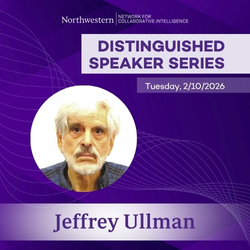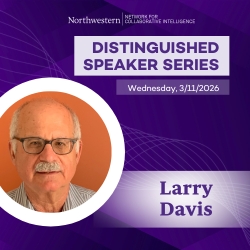Events
Past Event
Python Fundamentals Bootcamp (In-Person)
Northwestern IT Research Computing and Data Services
9:30 AM
//
TBD, Wieboldt Hall North Entrance
Details
This four-day bootcamp provides an engaging, comprehensive, hands-on introduction to the Python programming language. Python is an extremely popular, general-purpose, versatile coding language with a shallow learning curve, meaning you can do a lot with the tools you’ll learn in this four-day workshop. This in-person workshop will not be recorded.
Prerequisites: You will need to bring a laptop to participate. If you're already proficient in another coding language and you're looking for a beginner's introduction to Python because you want to be able to read and run Python code written by others or utilize Python packages for machine learning, web scraping, or text analysis, you should attend at least the first two-and-a-half or three days of the bootcamp. If you're looking to become a proficient Python coder, you should attend all four days of the bootcamp. The instructor will not be able to help you catch up if you miss materials.
Registration Required. Register only once for all four days of this bootcamp.
Time
Tuesday, September 17, 2024 at 9:30 AM - 3:30 PM
Location
TBD, Wieboldt Hall North Entrance Map
Contact
Calendar
Northwestern IT Research Computing and Data Services
"Big-Data Algorithms That Are Not Machine Learning" - Jeffrey Ullman
Northwestern Network for Collaborative Intelligence (NNCI)
12:00 PM
//
3514, Mudd Hall ( formerly Seeley G. Mudd Library)
Details

Join us for an in-person Distinguished Speaker event featuring Jeffrey Ullman, a prominent figure in computer science whose contributions have shaped the foundations of algorithms, databases, and theoretical computing.
Title: "Big-Data Algorithms That Are Not Machine Learning"
Abstract: We shall introduce four algorithms that run very fast on large amounts of data, although typically the answers they give are approximate rather than precise. (1) Locality-sensitive hashing (2) Approximate counting (3) Sampling (4) Counting triangles in graphs.
Lunch will be provided. Registration is required.
Jeff Ullman is the Stanford W. Ascherman Professor of Engineering (Emeritus) in the Department of Computer Science at Stanford and CEO of Gradiance Corp. He received the B.S. degree from Columbia University in 1963 and the PhD from Princeton in 1966. Prior to his appointment at Stanford in 1979, he was a member of the technical staff of Bell Laboratories from 1966-1969, and on the faculty of Princeton University between 1969 and 1979. From 1990-1994, he was chair of the Stanford Computer Science Department. Ullman was elected to the National Academy of Engineering in 1989, the American Academy of Arts and Sciences in 2012, the National Academy of Sciences in 2020, and has held Guggenheim and Einstein Fellowships. He has received the Sigmod Contributions Award (1996), the ACM Karl V. Karlstrom Outstanding Educator Award (1998), the Knuth Prize (2000), the Sigmod E. F. Codd Innovations award (2006), the IEEE von Neumann medal (2010), the NEC C&C Foundation Prize (2017), and the ACM A.M. Turing Award (2020). He is the author of 16 books, including books on database systems, data mining, compilers, automata theory, and algorithms.
Time
Tuesday, February 10, 2026 at 12:00 PM - 1:30 PM
Location
3514, Mudd Hall ( formerly Seeley G. Mudd Library) Map
Contact
Calendar
Northwestern Network for Collaborative Intelligence (NNCI)
"Fun with Fashion" - Larry Davis
Northwestern Network for Collaborative Intelligence (NNCI)
12:00 PM
Details

Join us for an in-person Distinguished Speaker event featuring Larry Davis, a leading figure in computer vision and artificial intelligence whose influential academic career and recent industry innovations at Amazon have helped shape modern approaches to visual understanding and generative media.
Title: "Fun with Fashion"
Abstract: More than 100,000,000 customers shop for clothing online at Amazon annually in the United States alone. The fashion catalogue is enormous and changes with high velocity as new styles are introduced and older items either go out of fashion or out of stock. Customers are challenged to find clothing that fits their style and their bodies at a price that fits their budgets. The Amazon Fashion science team addresses these challenges through the design and development of new machine learning and computer vision models that help customers navigate the catalog and efficiently evaluate items Amazon is recommending to them. The talk will discuss solutions the team has developed to problems including virtual try on (what will this garment look like on me?), complementary recommendations (how do I style this garment?) and size recommendations (what size, if any, of this garment will fit me?), emphasizing the challenges introduced by the need to have scalable solutions.
Lunch will be provided. Registration is required.
Larry Davis is a Senior Principal Scientist in Amazon’s Fashion and Fitness organization. He joined Amazon in 2018 after a long career in academics. At Amazon he worked on introducing novel customer experiences for fashion shopping like outfit builder (based on complementary recommendations) and virtual try on. He led Amazon’s first GenAI team for image and video synthesis, developing models to diversify the catalogue to make it more relatable for our customers. . He received his Ph. D. from the University of Maryland in 1975 and from 1977-1981 was an Assistant Professor of Computer Science at the University of Texas in Austin. He returned to the University of Maryland in 1981 and was the founding Director of the University’s Institute for Advanced Computer Studies (1985-1994). He also served as Chair of the Department of Computer Science from 2000-2012. Larry retired from the University in 2021 and is now a Professor Emeritus and a College Park Professor. He advised more than 75 Ph. D. students at Texas and Maryland. His work spanned many aspects of computer vision, including applications in visual navigation, robotic vision, media forensics, remote sensing,fashion and fundamental problems of object detection and activity recognition. He is a Fellow of both the IEEE and the ACM.
Time
Tuesday, May 12, 2026 at 12:00 PM - 1:30 PM
Location
Calendar
Northwestern Network for Collaborative Intelligence (NNCI)
